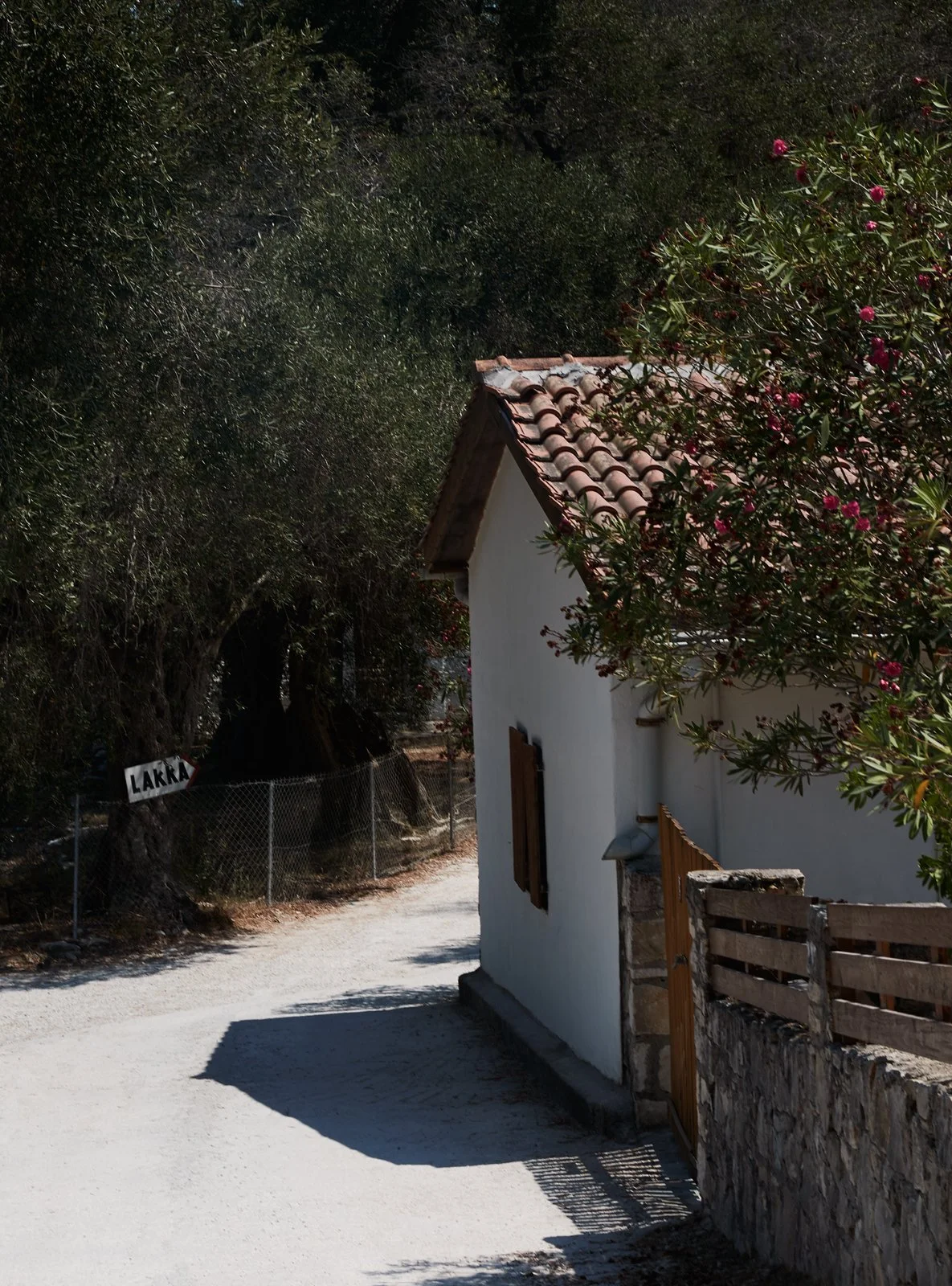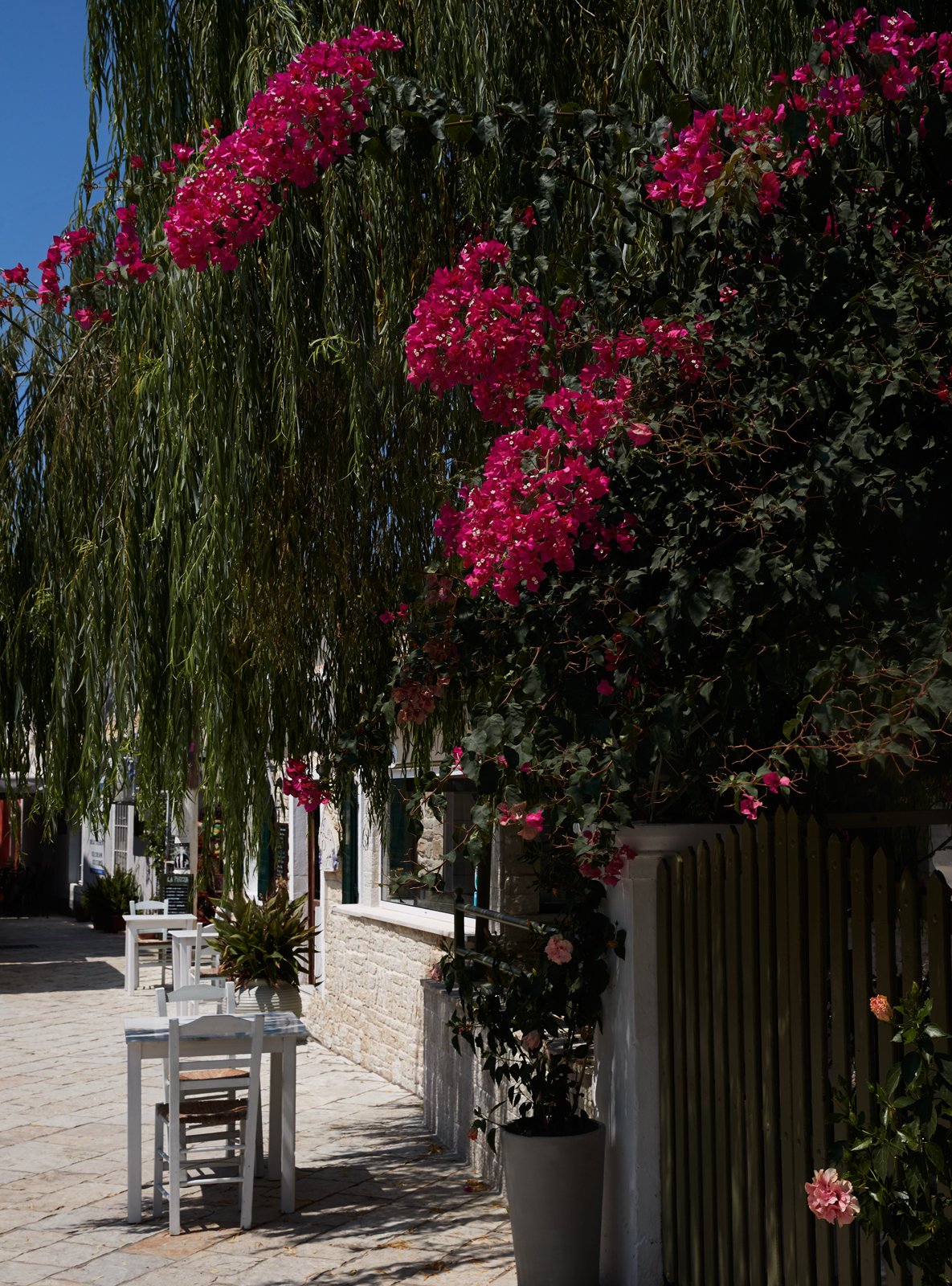GUIDE / LAKKA / THE GREAT UNWIND
Why do so many people dream of visiting Greece? And once they do, why do they so often return, year after year? To most, Greece is synonymous with its islands, which is not so strange considering that Greece has more than 6,000 islands and islets (though only 227 are inhabited). Some of these, such as Mykonos, Rhodes, Kos and Crete, are hugely popular vacation destinations, while others, particularly smaller islands without their own airport, still remain virtually unspoiled.
Paxos, south of Corfu, is one them, reachable only by boat. To get to Paxos, most travel to Corfu and from the Corfu New Harbour, they take the ferry to Gaios, capital and main harbour of Paxos. Even though Paxos is one of the smallest of the Ionian islands, with a total area of 76 square kilometres and only 13 kilometres in length, it is still difficult to cross by foot, especially considering the intense Greek sun, so make sure you have secured transportation to Lakka, located on the other side of the island, before arriving.
Paxos’ geographic location, west of mainland Greece and south of the heel of Italy, means that it is not as close to most of the other Greek islands, located mainly in the southwest of Paxos (making it hard to include in traditional island hopping-trips). Historically, this has been considered a very strategic location, and throughout the centuries, it has been ruled by Romans, attacked by pirates and harboured Crusaders. Today, it is far from being a hotspot for international politics. Much of its rural landscape is covered in olive groves, stretching from the sleepy town Lakka in the north to slightly more bustling Gaios in the south.
The production of olive oil, soap manufacturing and fishing were the three main industries of Paxos until the 1960s, when it first became a tourist destination. However, as the island is not so easy to get to, this has not really transformed the island (as it has in many other places) and so the rural impression and slow lifestyle is still more or less intact.
Lakka is a harbour town, on the most northern tip of the island, facing southern Corfu (which however is too far away to be seen). There are only two small and narrow roads that connect Lakka with Gaios, so arriving in Lakka by car always happen the same way and along the same route. The car will take you past numerous olive groves, churches and a few local cafés, until you come to what looks like a gathering of houses. Lakka is by all definitions a town, but just barely. Almost as soon as you arrive, you will be able to see the ocean, which is on the other side of town from the road. Lakka has the perfect location for a harbour, placed inside a small, rounded bay, the rocks form a natural protection from the sea, so even when it is stormy, the Lakka waters will be calm.
Not many people live in Lakka, so within days of your visit, you will be able to recognize most of the proprietaries of the restaurants and shops, as routines here vary very little from day to day. From May to October, every day follows the same pattern as the day before, making it easy for visitors to get into vacation mode and simply relax. There are two food shops, a great gelato café and several restaurants that serve food of excellent quality and with great service. Lakka also has two beaches, the larger being pebbled Kanoni beach and the smaller the sandy Harami beach. The two are only a few minutes from one another by foot, and many people like to swim back and forth between the two in the sea beneath the connecting footpath.
¨You can do a bit of everything, but usually you end up doing mainly nothing. ¨
Perhaps this is the key to understanding the popularity of Lakka and other similar Greek harbour towns? You can do a bit of everything, but usually you end up doing mainly nothing. In the morning, perhaps you will go for a swim and read a few pages of a crime novel under the shade of an olive tree. For lunch, you have Greek salad in a nearby café, before returning for yet another swim. Then you rest for a few hours, and once the siesta is over, you go for gelato and a slow stroll around town, looking at the selection of local olive oils, soaps and wine (but probably ending up buying nothing). In the evening, you choose between a restaurant overlooking the water or one closer to the main square, but regardless, the food you end up eating will be locally sourced and freshly prepared, served in a kind and friendly manner. The next morning, you take your book and find another tree to rest under, while contemplating going for a swim, and so the days pass, one by one, soon impossible to separate from one another. Is it Monday or Wednesday? How long ago since you arrived and when are you actually supposed to check out? No one really knows or cares.
Similar to many other Greek island destinations, Lakka has two sides, connected to the changing of seasons. There is no exact date for when the summer season arrives. People will arrive here around April or early May, ordering supplies and opening their shops, preparing their restaurants and getting their hotels in order. They will catch up on what has happened in the winter months, make necessary house renovations and plan for the coming season. In the summer months, they welcome visitors from mainland Greece, Italy, Germany and England (as well as other places). Again, there is no set time for when the season ends, but the winds will gradually become cooler around October, as will the ocean. More and more of the business owners will close down and return to their home in Athens and Lakka will turn into a ghost town, still beautiful, but almost completely empty. For many, this is not a time to visit, but for those truly seeking a secluded and private place, perhaps looking for somewhere to finish a book project or something else that requires concentration and solitude, the winter period can be equally magical (though grocery shopping will be an issue).
¨Rather, the question is, why go anywhere else? ¨
After spending time in Lakka, the introductory question of why people visit Greece soon becomes superfluous. Rather, the question is, why go anywhere else? The turquoise waters, sunny weather, healthy and delicious local food, cold Mythos beer, traditionally white houses and peaceful way of living is utter and complete relaxation, its effect not unlike receiving a full body massage, every day. The effects of the Lakka way of life will stay with you for a long time after you have left, as the tan slowly fads, the memory of the warm and long afternoons in the turquoise bay, swimming by the yachts temporarily anchored here, remain in your mind, instantly relaxing your body as you reminisce about the lazy days you spent in this small, sleepy Greek harbour.
To stay
Family owned hotel, with saltwater pool, by Kanoni beach.
Lakka Bay
49082 Lakka
Paxi
Greece
Nice hotel by the harbour.
Lakka 490 82
Paxi
Greece
+302662031137
Villas and apartments for rent in central Lakka
Provincial Road Loutra
490 82 Lakka
Paxi Greece
+306973962784
To eat
O Diogenis Taverna
Traditional recipes, locally sourced food, great service.
Lakka 490 82
Paxi
Greece
+30 2662 031442
Restaurant Stasinos
Restaurant with a lovely garden, fresh food and very friendly service.
Lakka 490 82
Paxi
Greece
Elegant seaside restaurant with great waterfront terrace.
Lakka 490 82
+302662031247
Gelato Italiano
Close to the main square.
Best gelato on the island.
+306973220014





















